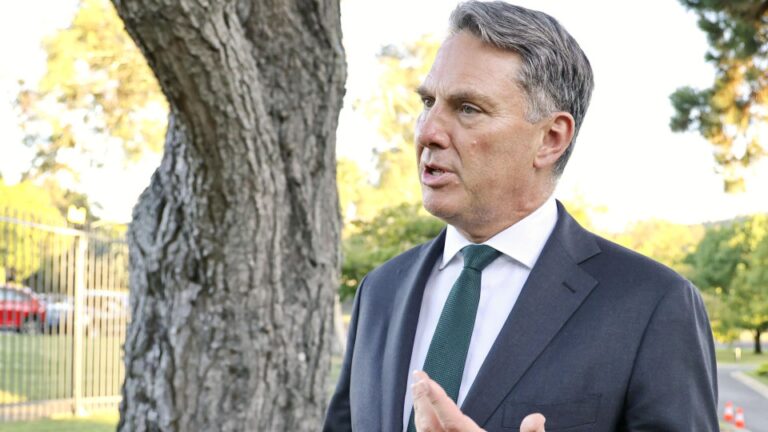Deputy Prime Minister and Minister for Defence, Richard Marles, said in a recent interview that Australia is keen for Japan to collaborate with the AUKUS Security Partnership, which also includes the US and UK, on future defense technology development.
While ruling out Tokyo's participation in AUKUS's flagship project to transport a nuclear-powered submarine to Canberra, Mr Marles said Australia wanted to “work more closely with Japan” on technology development, adding that the Asian country was “a key player in innovation”. “at the cutting edge of technology.”
In an interview with Kyodo News, he said, “In terms of future joint cooperation, I think it's natural for Japan and the United States, the United Kingdom, and Australia to discuss a higher level of cooperation.'' . in Australia's capital.

Australian Deputy Prime Minister and Minister of Defence, Richard Marles, answers an interview in Canberra, Australia's capital, on February 13, 2024. (Joint)
AUKUS was launched in 2021 as the United States and its allies step up security cooperation amid China's growing assertiveness in the Indo-Pacific. The first pillar focuses on the acquisition of nuclear submarines, while the second pillar aims to develop various advanced capabilities in areas such as artificial intelligence and hypersonic missiles.
While AUKUS is open to engaging with allies and partners on Pillar 2, Marls said AUKUS remains “very focused on working on new innovative technologies across the three countries” and that it is not working with Japan. He suggested that cooperation would not materialize anytime soon.
“As Pillar 2 becomes more mature, which will take several years…I think at that point there will be an opportunity to consider how we can work with Japan in relation to that,” he said.
Canada and New Zealand have also expressed interest in collaborating with AUKUS members in the Pillar 2 area.
When asked whether the Japanese government should also consider acquiring nuclear submarines, the Australian minister said that it was a “Japanese issue” and that he was “not going to express an opinion.”
Mr Marles said Australia had made the decision “considering its strategic needs”, noting that as an island nation far removed from other countries it was “in dire need of capable long-range submarines”.
Mr Marles said of the bilateral defense relationship between Canberra and Tokyo: “Australia and Japan have never been more strategically aligned than they are now.”
The minister also welcomed the possibility that Japan could use Australia's vast continent as a testing ground for long-range missiles as it seeks to acquire the ability to strike targets in enemy territory.
Regarding Australia's long-distance test range, he said, “Our training range is one of the best in the world, and we very much hope that we will work with Japan on this training range and that Japan will have the opportunity to use it.'' Ta.
As part of a major shift in Japan's defense policy based on its pacifist constitution, Japan has pledged to acquire a “counterattack capability” by the end of 2022 amidst a difficult regional security environment. To this end, it plans to develop domestically produced long-range missiles and procure US-made Tomahawk cruise missiles.
Australia and Japan have strengthened their defense cooperation in recent years, signing a reciprocal access agreement that enables the rapid dispatch of defense personnel between the two countries, which entered into force in August last year.
Mr Marles reiterated both sides' “strong ambition” to foster relations and said Australia was “enthusiastic to accelerate the tempo” of cooperation.
Related coverage:
Japan and Australia discuss cooperation in military emergencies
Biden signs $886 billion defense bill to strengthen Indo-Pacific deterrence


